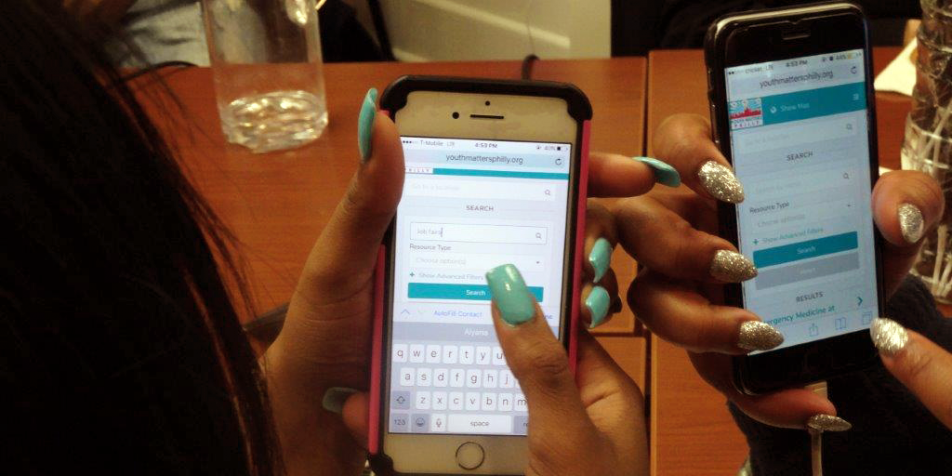Advocates Launch Youth Matters: Philly App for Youth in Foster Care or Experiencing Homelessness

Philadelphia, PA – To kick off National Foster Care Month today, Juvenile Law Center and University of Pennsylvania’s School of Social Policy and Practice unveiled Youth Matters: Philly – an innovative app created with Penn computer science students Rani Iyer, Zhiyu Meng, and Ben Sandler. The app is targeted towards youth in foster care or experiencing homelessness in Philadelphia, and helps them to connect with vital resources and programs easily and quickly.
The organizations are partnering with Philadelphia Department of Human Services and Councilwoman Helen Gym to hold a press conference about the app at 3:00 pm at the Achieving Independence Center.
“Older youth transitioning out of foster care face a number of challenges: securing housing, navigating educational opportunities, and moving into adulthood,” said Sue Mangold, executive director of Juvenile Law Center. “Because young people increasingly rely on apps to find what they need, Youth Matters: Philly is a much-needed tool to help them at a critical time in their lives.”
More and more, advocates for youth in foster care are recognizing the value of technology in serving young people. Juvenile Law Center and Penn were inspired to create Youth Matters: Philly after seeing a Los Angeles app for foster youth called Know B4 U Go, which provides support for youth transitioning out of care, and Donafy, an app which allows people to locate, notify and donate to nearby nonprofits serving people in need.
The two organizations connected with #Hack4Impact, which connects student software developers to nonprofits to develop tools for social change and chooses projects through a competitive process. The app allows users to browse resources ranging from food banks to shelter to health services, and has advanced search features to customize the experience. Young parents may be able to see where they can get a free car seat, and LGBT youth might discover housing opportunities targeted to them.
“I am so excited that this vision has become a reality,” said Johanna Greeson of Penn’s School of Social Policy and Practice. “#Hack4Impact received applications from us and from Juvenile Law Center for the same concept which really brought this together. We are incredibly grateful for the students’ time, expertise, and energy. Together, we have created something that I hope will provide vulnerable youth in Philly with better information and resources, ultimately contributing to improving their well-being.”
Councilmember Helen Gym, a fierce advocate for youth in the foster care system and youth experiencing homelessness, believes the app is one of many tools we must have in place for vulnerable youth.
“Youth Matters: Philly is a welcome addition to our toolbox for supporting our most vulnerable youth. I thank the Juvenile Law Center and their partners at Penn School of Social Policy and Practice for this important work and I look forward to supporting this critical partnership.”
Philadelphia Department of Human Services are hosting the event to launch the app, and have already trained a number of staff in how to best use it to help the youth they serve.
“Aging out youth are more at risk of not finishing high school, becoming unemployed and becoming homeless than their peers,” said Cynthia Figueroa, Commissioner of the Philadelphia Department of Human Services. “Creating a phone app is so smart – providing essential resources at young people’s fingertips. A huge thanks to the Juvenile Law Center and the University of Pennsylvania School of Social Policy and Practice for being part of the village protecting and caring for our City’s youth.”
For youth themselves, Youth Matters: Philly helps put the power back in their hands, allowing them to navigate a complex web of providers and services easily.
“Youth Matters: Philly is important because there are lot of homeless youth in the city of Philadelphia, and we do often have access to technology,” said Anthony, a member of Youth Fostering Change, Juvenile Law Center’s youth advocacy program. “Why not be able to use technology to locate things we need, like actual resources and programs? For one youth, it could be a matter of life and death. How great would it be for a youth with limited access to food and shelter to be able to easily locate a shelter or a food bank in their area. It would be amazing.”
Juvenile Law Center staff will be training youth service providers in this app throughout the month of May for National Foster Care Month. The site can be viewed and downloaded to a phone at both www.youthmattersphilly.org and www.youthmattersphilly.com.
CONTACTS:
KATY OTTO (JUVENILE LAW CENTER) OFFICE: 215-625-0551 ext. 128 EMAIL: [email protected]
Juvenile Law Center is the oldest non-profit, public interest law firm for children in the nation. Widely published and internationally recognized as thought leaders in the field, Juvenile Law Center’s impact on the development of law and policy on behalf of children is substantial. Juvenile Law Center uses an array of legal strategies and policy advocacy to promote fairness, prevent harm, ensure access to appropriate services, and create opportunities for success for youth in the foster care and justice systems. For more information about Juvenile Law Center’s work, visit www.JLC.org.
The University of Pennsylvania School of Social Policy & Practice contributes to the advancement of more effective, efficient, and humane human services through education, research, and civic engagement. In pursuit of this mission, the School’s theory-based masters and doctoral programs in social work, social welfare, nonprofit leadership, and social policy encourage students to think and work across disciplinary lines and cultures as well as across national and international boundaries. The pursuit of social justice is at the heart of the School’s knowledge-building activities. The innovative educational and research programs reinforce the School’s vision of active student engagement in their own learning as well as that of social agencies and larger social collectivities organized at the local, national, and international levels.